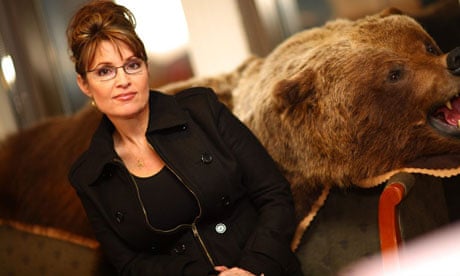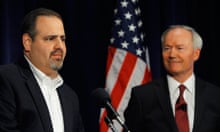Sarah Palin says the Republican party should forget about the consultants and not listen to "the big money men". After getting past the hypocrisy – Palin's own PAC spent 94% of its funds on consultants in 2012 – I have to wonder why candidates would take political advice from the former governor of Alaska.
In fact, here are five reasons why Palin's own rise and fall with voters demonstrates why her political judgment should not be trusted.
1. Palin's is probably the only vice-presidential bid in modern history to have cost her ticket
Palin burst onto the scene back in 2008, when her Republican National Convention speech launched her to a 57% favorable rating, with only 21% holding an unfavorable view, according to a CNN/ORC poll. This, in turn, provided new fuel to John McCain's presidential run, and he took his first lead of the campaign.
Then, Palin started talking to reporters. By the time the campaign was over, Palin had a 48% favorable rating and a 49% unfavorable rating in a CNN/ORC survey. Only 38% of voters answered "yes" to the exit poll question of whether she was prepared to be president.
Palin was so divisive that her decline correlated highly with that of McCain's standing against Obama. As Richard Johnston and Emily Thorson noted in 2009, the rise and fall of McCain's polling numbers didn't really correlate with how the economy was doing. Nor did they particularly have much to do with how voters saw McCain.
Roy Elis, Sunshine Hillygus,and Norman Nie calculated that Palin cost McCain four percentage points. Had she not been selected as vice-president, McCain would still have lost by 3pt – but the election would have been much closer. I'm not aware of any other vice-presidential candidate who has had that sort of effect, either negative or positive.
2. Palin quit her elected post
At a time when the Republican party is struggling, they need to look to a person who sees trouble and doesn't shy away. Back in 2009, the party was struggling to find a standard bearer after George W Bush's unpopular administration. Palin, at that same time, was facing ethics investigations in Alaska.
Did she govern the people of her state? Hardly. She decided to skip town in mid 2009, when she resigned as governor, and it's unlikely anyone will ever know exactly why she did so.
Palin herself gave numerous explanations. She didn't want to spend any more taxpayer money over the ethics investigation. Or she didn't want to be a lame-duck governor once she knew she wasn't running for a second term.
Other, less justifiably reasons for her departure might include the millions she could reckon on making on the speaking circuit and television. She may also have left because she didn't think she could win a second term. Her approval rating in Alaska had dropped almost 30pt from its highest point, 82%, in mid-2008.
Whatever the reason, Palin took the easy way out. At least Mitt Romney finished his one term as Massachusetts governor, even after he chose not to run again.
3. Palin has palled on the American public
The Republican party's troubles over the past seven years have mostly been because of George W Bush. The economy declined significantly under his administration, and his war in Iraq proved unpopular. Moving forward, Republicans should prefer a leader who is, at least, more popular than Bush.
But Sarah Palin is actually less popular than Bush. Palin's favorables have continued to fall over the past four and a half years. She currently holds ratings of 34% favorable and 58% unfavorable in the latest CNN/ORC poll. That's nearly a 40pt rise in her unfavorable rating since the 2008 RNC speech. George W Bush's favorable rating, meanwhile, stands at 43%.
If the Republican party grassroots followers were to follow to Palin's messaging advice, they might drive their entire party off the cliff.
4. Republicans themselves don't want Sarah Palin
Perhaps the greatest indictment of Sarah Palin is that even Republicans don't care for her. Her net favorable rating among conservatives is in the bottom half of all possible 2016 Republican contenders, per the left-leaning Public Policy Polling (PPP). The only candidate with a noticeably lower favorable rating is Chris Christie, whom many Republicans won't forgive for saying kind words about President Obama after Hurricane Sandy.
And despite near-universal name recognition, she finished with only 7% in her last appearance in a 2016 national primary poll. That's tied for second to last, ahead only of Rick Santorum. Her ratings were so low that PPP dropped her from its latest survey. Other survey houses, like Harper and CNN/ORC, don't include her in their 2016 questionnaires.
5. The Alaskans who know Sarah Palin best hold her in low regard
You can argue that Sarah Palin is misunderstood by the national press, and it could be argued that the "lamestream media" returns Palin's compliment with negative stereotyping of the former Alaska governor. She should not have this problem with the local Alaskan press. Their reports should be noted, especially since Palin was once so successful there that she defeated an incumbent governor in 2006 and was enormously popular in 2008.
But Palin is just as unpopular at home as she is nationally. Her favorable rating in the latest survey by the right-leaning Harper Polling is 34%. The only person with a worse favorable rating is her protege, Joe Miller. Her unfavorable rating in Alaska is 60% – the highest of any of politician polled.
Most amazingly, Palin could not now even win a Republican primary in Alaska. In a hypothetical Senate primary between three other candidates and Palin, she only registers 27%, landing second place behind Sean Parnell, the governor who replaced her.
Conclusion
The truth is that Sarah Palin was very briefly a successful politician, then a divisive one; and she has chosen instead a career path as a celebrity. Republicans would be nuts to follow her advice, unless they wanted to follow her path to unpopularity.







